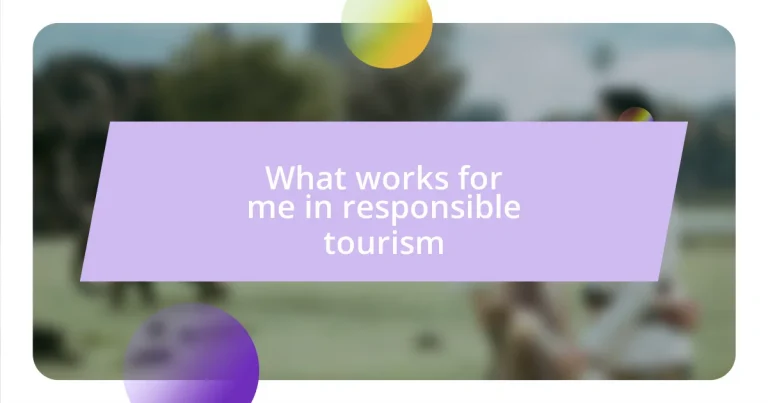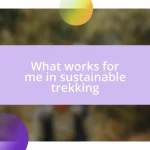Key takeaways:
- Responsible tourism involves making purposeful travel choices that support local communities and preserve the environment.
- Engaging with local cultures and communities fosters deeper connections and enriches travel experiences while promoting sustainability.
- Sharing travel experiences and educating others about responsible practices can inspire wider adoption of sustainable tourism habits.
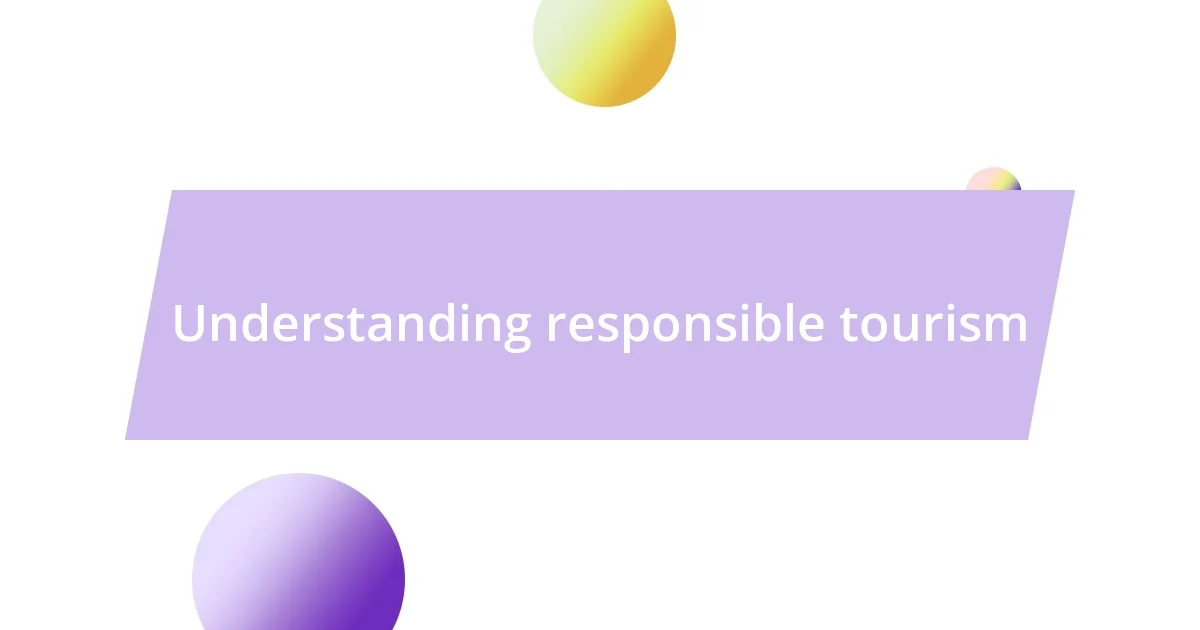
Understanding responsible tourism
Responsible tourism is more than just a trend; it’s a commitment to traveling with purpose. I remember my first experience visiting a small village in Southeast Asia, where I learned that every dollar spent could support local artisans and their families. It made me realize the power we have as travelers to make a positive impact rather than merely consuming.
Have you ever considered how your travel decisions ripple outwards? When I chose to stay in a family-run guesthouse instead of a big hotel, I noticed firsthand how that small choice shaped the community. The warmth of the locals, their stories, and the authenticity of their culture enriched my experience far beyond the superficial comforts of commercialized tourism.
Responsible tourism also means respecting and preserving the environment. On a hiking trip, I was struck by the beauty of the natural landscape, but I couldn’t ignore the litter left behind by careless visitors. It made me wonder: how can we appreciate and protect these places we love? Each time we make eco-friendly choices, like reducing plastic usage or staying on trails, we are taking a stand for the destinations we cherish.
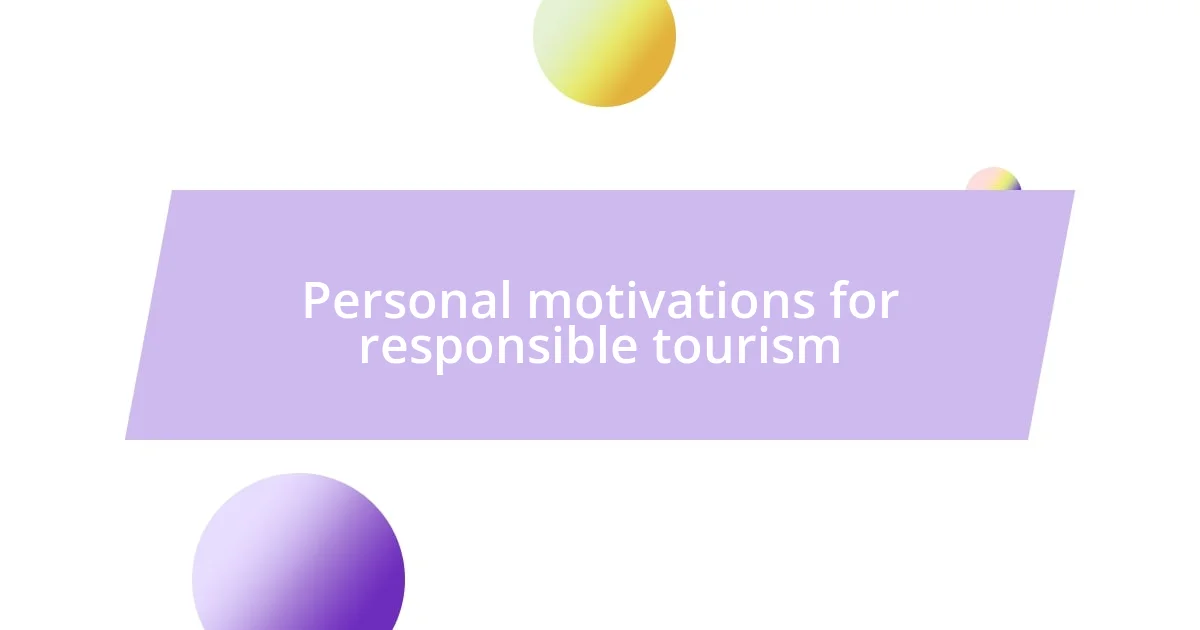
Personal motivations for responsible tourism
When I think about what drives my responsible tourism choices, it’s often the stories of the people I meet along the way. For instance, during a trip to a coastal village, I chatted with fishermen who shared their struggles against overfishing. Hearing their passion for sustainability struck a chord with me, urging me to make more mindful decisions, like opting for sustainable seafood during my travels. It’s these connections that deepen my commitment to supporting local economies.
Some motivations that shape my dedication to responsible tourism include:
- Cultural appreciation: I want to truly learn about and connect with the places I visit, not just skim the surface.
- Environmental impact: I feel a personal responsibility to help preserve the beauty I enjoy wherever I roam.
- Community support: Knowing that my choices can uplift local families and foster their traditions inspires me to choose local businesses over corporations.
- Personal growth: Engaging with diverse cultures challenges my perspectives and enriches my life experiences.
- Legacy for future generations: I want to contribute to a world where my children can enjoy the same beautiful places, just as I have.
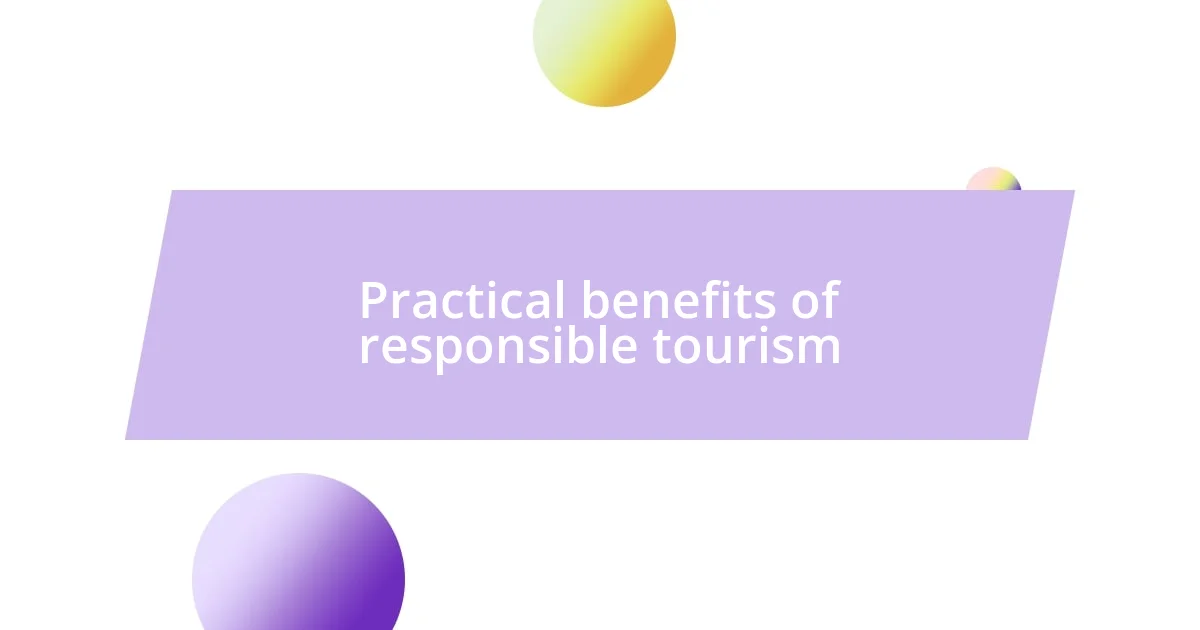
Practical benefits of responsible tourism
Responsible tourism brings practical benefits that extend beyond personal enjoyment. For instance, when I engaged with local artisans in a small village, I noticed how my purchases helped preserve traditional crafts. It wasn’t just about buying a souvenir; it was about playing a role in maintaining a way of life that is rich in history and culture. This reinforces the idea that responsible choices can foster economic stability in communities that rely on tourism.
Moreover, choosing responsible tourism often enhances the quality of my travel experiences. During a recent eco-tour, the guides were not just experts; they were locals who shared insights about their environment that I could never find in a guidebook. This intimacy allowed me to connect on a deeper level with the area and really appreciate the nuances of the local ecosystem. It made me appreciate my role in preserving these beautiful places while amplifying the stories behind them.
I’ve also noticed that responsible tourism can create a sense of shared purpose among travelers. For example, participating in a beach cleanup during my vacation transformed strangers into friends, all united by a commitment to protecting nature. This camaraderie not only made the experience more enjoyable but also left a lasting impression that inspired us to be stewards of the environments we cherish, even after returning home.
| Benefit | Description |
|---|---|
| Economic Support | Directly benefits local communities and preserves traditional arts. |
| Enhanced Experiences | Provides deeper insights and connections with local culture and environment. |
| Community Building | Fosters friendships among travelers through shared goals and initiatives. |
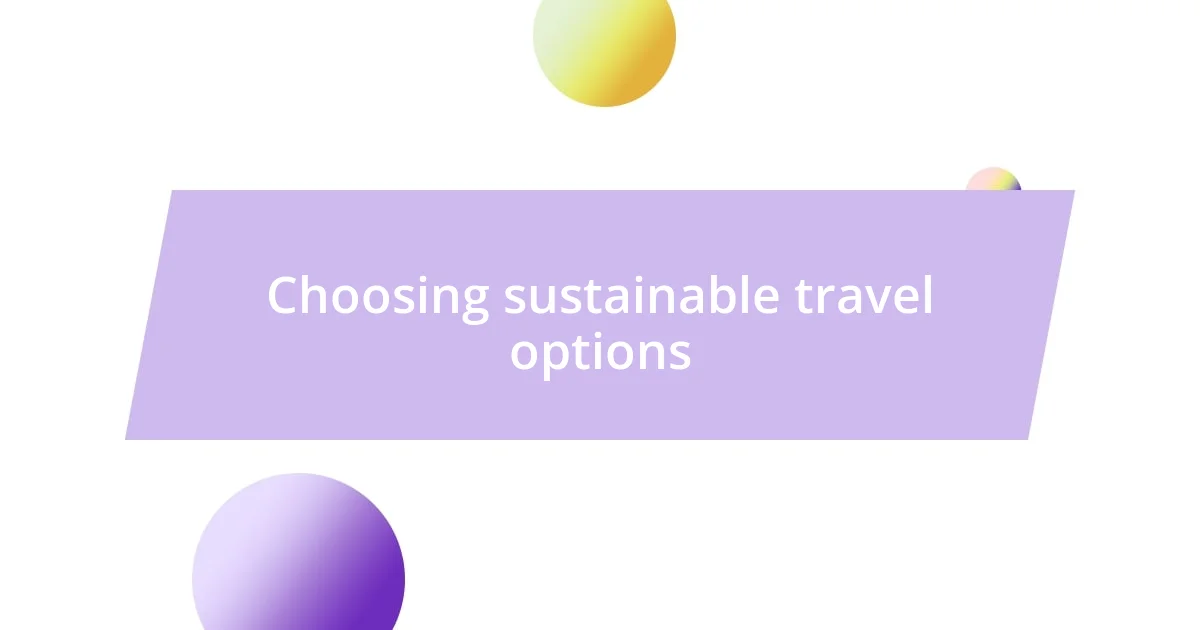
Choosing sustainable travel options
Choosing sustainable travel options is about more than just checking off a box; it’s a mindset shift that becomes part of your travel identity. I remember standing at a crossroads in Thailand, where I could choose to explore an elephant sanctuary that emphasized ethical treatment or join a commercialized tour promising flashy experiences. The decision was simple when I considered the long-term well-being of these majestic creatures. It’s moments like these that make me realize how impactful our choices can be—each one holds the power to either uplift or exploit.
When searching for sustainable accommodations, I’ve found that prioritizing eco-friendly lodges often enriches my stay. I once booked a small, locally-owned guesthouse that utilized solar power and sourced organic produce for breakfast. The difference was palpable; every morning, I was greeted not just with a meal but with stories of local farmers and the land. Choosing such options connects me to the community in a way that larger resorts simply can’t replicate. Have you ever experienced a similar connection during your travels?
Transportation choices can heavily influence the sustainability of our trips. I often opt for trains or buses over flights when traveling through Europe. Not only does this reduce my carbon footprint, but I also get to see the landscape unfold around me—a delightful insight into local life. On one journey, I struck up a conversation with a fellow traveler, and we exchanged tips about hidden gems in our planned destinations. This experience taught me that sometimes, the journey itself can be just as enriching as the destination when we choose sustainable paths.

Engaging with local communities
When I traveled to a small coastal town, I made it a point to attend a local festival where I met residents who shared their culture and traditions. One especially touching moment was when a local elder taught me traditional dance steps, laughing as I awkwardly followed along. This interaction deepened my understanding of their community, and I couldn’t help but wonder how many travelers miss out on these rich experiences by sticking to tourist traps.
I also find it profoundly rewarding to volunteer in local initiatives. While on an island, I joined a project aimed at preserving marine life. The locals welcomed us with open arms, sharing their knowledge about sustainable fishing practices and the impact of pollution on their waters. I left not just with memories, but with a stronger connection to the people and their efforts to protect their environment. After all, isn’t there something special about working together towards a common goal?
Engaging with local communities often leads to unexpected friendships. One evening, while dining at a family-owned restaurant, I struck up a conversation with the owner, who shared stories about their journey to maintain the eatery’s authenticity in a sea of commercialization. Their passion for preserving local flavors reminded me that our choices in travel can contribute to keeping these beautiful stories alive. How often do we take a moment to connect and learn from those who call these places home?
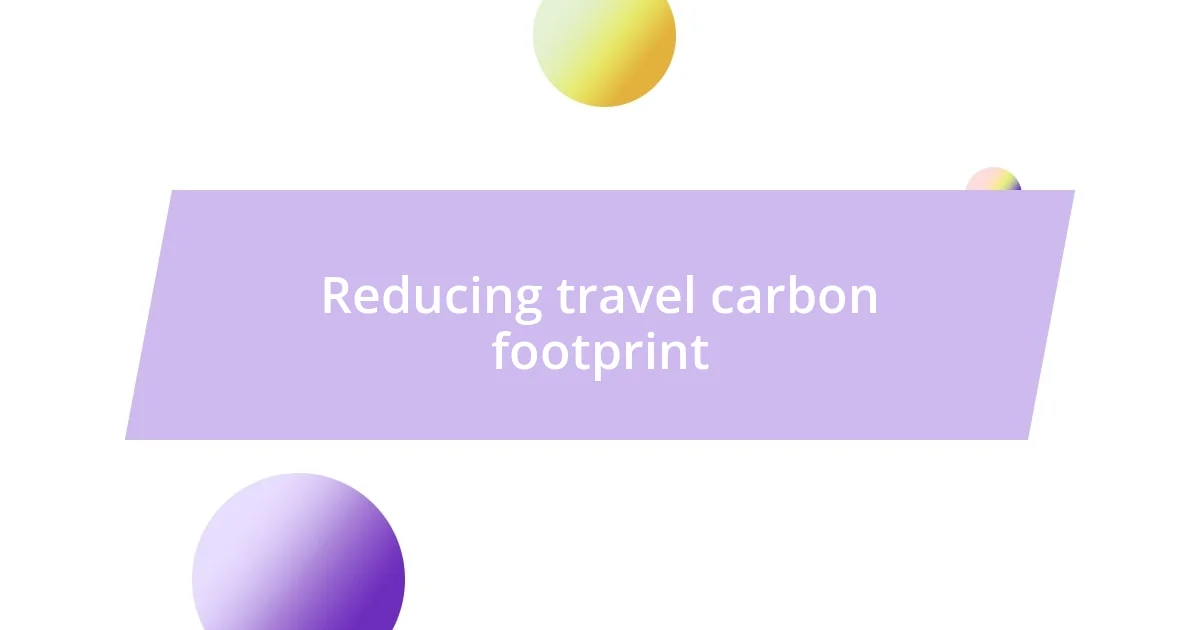
Reducing travel carbon footprint
Reducing the carbon footprint of our travels starts with… just being more intentional. I clearly remember my trip to Iceland, where I chose to rent a bike instead of using a car. The fresh air, the scenic views, and the sense of freedom were exhilarating. Plus, I left nothing but tire tracks on the path! Have you ever considered that your mode of transport can transform not just your journey, but also the environmental impact of your exploration?
Opting for direct flights whenever possible is another small change that can make a big difference. I once flew directly to a remote corner of Costa Rica, cutting down on unnecessary layovers that are notoriously inefficient. It felt rewarding to know I was contributing less to emissions while diving into one of the world’s most biodiverse places. It’s amazing to think that one decision could mitigate our overall travel impact—less time in the air means more time enjoying nature and connecting with the local people.
Lastly, I’ve found that packing light can significantly reduce our travel carbon footprint. During a trip to Japan, I challenged myself to the bare essentials. Not only was it liberating, but I noticed the ease it brought to my travels. I wasn’t weighed down by excess luggage or the hassle of logistics; instead, I could immerse myself in the culture. Isn’t it interesting how simplicity can lead to more meaningful experiences? Every small step counts when striving for responsible tourism.

Sharing experiences and educating others
When I share my travel experiences, I often think of how they can inspire others to embrace responsible tourism. I recall a moment in a small village in Peru where I joined a group of travelers for a workshop led by locals. They taught us about traditional weaving techniques, and as we struggled to replicate their intricate patterns, laughter filled the room. Sharing that experience with others created a ripple effect; it sparked conversations about cultural preservation and the importance of authenticity in travel. Don’t you think we each have stories that could ignite curiosity and respect for different cultures?
I’ve also found that educating others about sustainable practices can be incredibly impactful. One evening on a camping trip, I spoke with fellow travelers about the benefits of leaving no trace in nature. As I shared my experience of how a campfire can affect local wildlife and plant life, I could see their eyes widen with realization. It’s remarkable how a simple discussion can open a window to new perspectives: aren’t we all responsible for the places we visit?
Turning my travel stories into educational sessions has become a passion for me. After returning from a trip to Thailand, I organized a small gathering where I shared my insights about the challenges faced by local artisans. We discussed the balance between tourism and cultural integrity, and I felt energized by the conversations that followed. It’s fulfilling to see others reflect on their travel habits and consider their impact. Aren’t these connections what travel should be all about?












